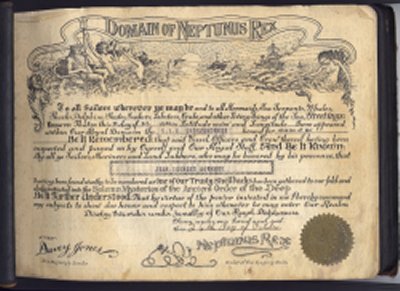

The Shellback Certificate was issued to sailors that crossed the equator on any naval vessel. The Crossing the Equator ceremonies would often be one of the most memorable experiences of Navy men, and would be a time of great revelry where those that had never crossed the equator would be subjected to hazing in the form of dressing like hula girls amongst other things.
(Jump to the stories)
The military touched the Pend Oreille Valley in many ways, from the amount of men that served, to the creation of Farragut Naval Training Station in nearby Athol, Idaho on Lake Pend Oreille. There were some young men from the Valley that gave their lives and some that were prisoners of war, as well as a number of women that served in the military from this area. Immediately following Pearl Harbor as was the case throughout the nation, there were immediate volunteers, many of which left their jobs in the mills, the mines, or on the farms. There of course were a number that waited to be drafted, especially those that were in high school, leaving graduating classes full of mainly girls, a scenario that occurred throughout the United States.
Faith McClenney: It was just like, okay you'd come to school and the desk would be empty and they'd say so and so, Larry Masterman or O.B. Scott or whoever, they've signed up and their gone.
While the Pend Oreille Valley sent its young men to war, other communities were sending their young men to the newly formed Farragut Naval Training Station. This base was constructed in nearby Athol, Idaho on Lake Pend Oreille, with lumber from the Diamond Match Mills and construction workers from the surrounding areas. Many left their jobs in the woods to go to work on Farragut because they were paying such high wages. Bill Piper was one of these that left the woods for the summer to work at Farragut, and remembers what it was like driving to work:
You had to get there early because it was single file on those primitive roads, and if you had guts enough to get out in that other lane, 'cause there wasn't much traffic coming the other way, and you'd go like hell, and they wouldn't let you back in. Because there were about 20,000 working out there. I worked in the truck dispatch, we did everything there. They kept a couple pickups there and the Superintendent bosses used the pickups to get around the project with. I suppose the Big Bosses had their own, but they would call and want a pickup and the truck dispatch would ask who would want that and they go up and pick them up and show them around wherever he wanted to go and the ambulance crews were there and all the transports went out of the truck dispatch.
The building of Camp Farragut with its 776 buildings was a huge boost to the local economies of towns like Newport, Sandpoint, and Coeur d'Alene, but the involvement of the local communities wasn't limited to building the base.
The 300,000 "Blue Jackets" that went through Farragut were welcomed into the neighboring communities, to spend their money, to sightsee, or simply to become surrogate sons for those whose own sons were away from home. In Sandpoint and Newport, as well as the other small towns of the area, sailors flocked to these places on their liberties. Sailors would be treated to all sorts of social activities, such as going to dances held every Saturday night for free, even something as simple as sitting around the soda fountain at Kimmel's Drug Store. Dory Schwab, who was in high school at the time, remembers how much fun the sailors were:
Well Farragut was running wildly over there and every Saturday night a bunch of the sailors used to come over and we always had dances at the high school to a local band. And oh wow, we had a good time!
It wasn't just during liberties that the neighboring communities took care of the Blue Jackets from Farragut, as they would also send care packages to them during holidays, and invite them over for meals when the men needed it. Because of the treatment these sailors received from these communities, many would eventually settle down in this area, remembering how beautiful it was as well as its friendliness.
The stories of the Blue Jackets that were from this area are on the following pages.
The trains that traveled through on the Northern Pacific lines had to stop in Newport for water as their engines were steam driven, allowing the girls in Newport the opportunity to go down to the train depot and visit with the troops headed for their embarkation points. There really was no schedule when these trains would come through, but any girls that were in town often walked up and down the platform, exchanging smiles and often addresses with the troops, as they were not allowed off.
Evelyn Reed: We [girls] would be, well in the drugstore or whatever, and somebody would come up and say that there's a troop train coming in, and we would go down. And you'd walk up and down and talk to the guys and stuff and it was just a kinda like a miniature USO thing in Newport [laughs] but they would be here, see in those days those trains had to fill up with water. There was a big water tank out here, and they would be here for awhile and I don't think they were ever allowed off, I don't remember anything except windows down and all these heads out of the window and so on, but yeah we use to, there would be you know whoever what downtown would probably come in that age group [high school age]. I don't remember adults coming much for that it was kind of something that high school girls did.
Later in the war, some of the troops being shipped back and forth across the country would also come through, and Norma Rednour's first husband Dick Schirmer was an MP (Military Police) on the Empire Builder as it came through:
They had soldiers and so he was an MP on the train, so they had a lot of men on it. They all couldn't figure out how come he could come out and kiss four or five women on the platform and get back on the train, he was the envy of all the guys. [laughs] There was Helen and Margaret and I and the minister's wife, Lou Sanders and sometimes Dory I guess there would be four or five of us. He'd come out and give us all kisses or hugs and crawl back on.
Ted Schwab
55th Seabee Battalion, Company C, stationed in New Guinea and Alaska.
Robert Beaubier
30th Special Battalion Seabees, stationed in England

| Copyright © 2004 by Kristen Cornelis |